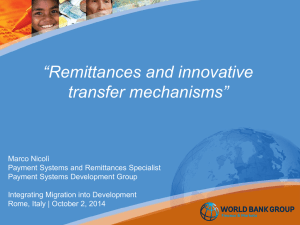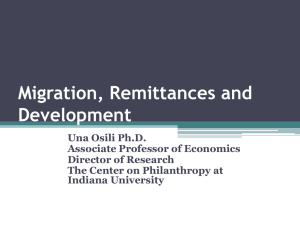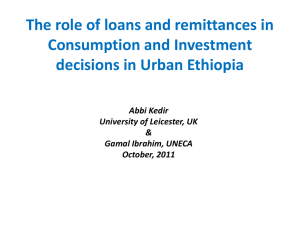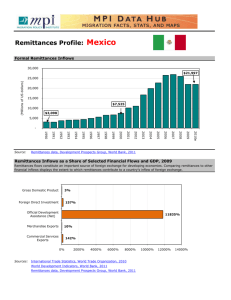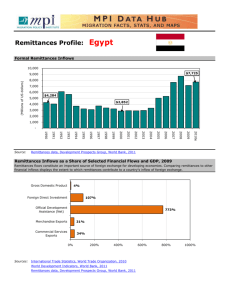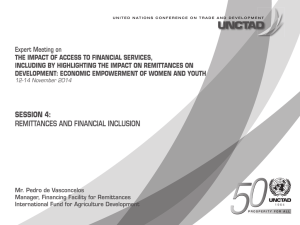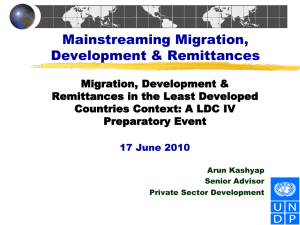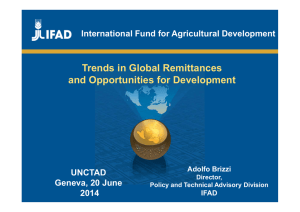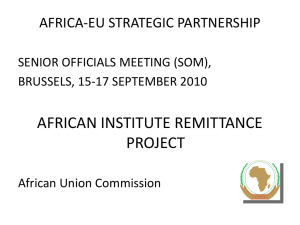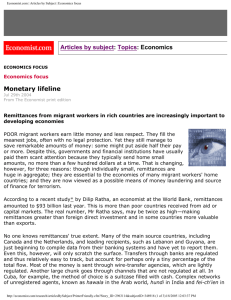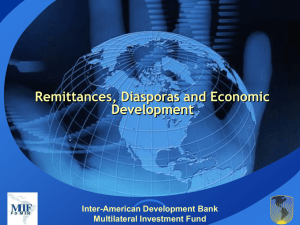Pedro De Vasconcelos
advertisement
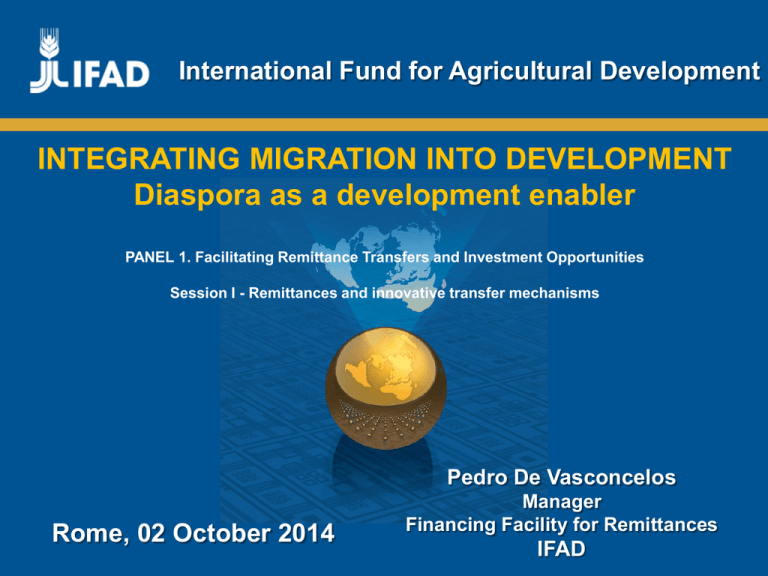
International Fund for Agricultural Development INTEGRATING MIGRATION INTO DEVELOPMENT Diaspora as a development enabler PANEL 1. Facilitating Remittance Transfers and Investment Opportunities Session I - Remittances and innovative transfer mechanisms Promoting innovative remittance markets and empowering migrant workers Pedro De Vasconcelos and their families Manager Financing Facility for Remittances Rome, 02 October 2014 IFAD Remittances and Development Opportunities IFAD and Remittances : Mission statement Our goal is to: Increase the financial resources of those who receive remittances, particularly in rural areas, Maximize the developmental impact of remittances once received, and Provide migrants and their families with opportunities to invest their capital in their home communities. Remittance and migration 101 Volume and size The migration and remittance cycle The remittance market: Challenges and opportunities Maximizing the development impact of remittances Remittances and Development Opportunities IFAD and Remittances : Mission statement Our goal is to: Increase the financial resources of those who receive remittances, particularly in rural areas, Maximize the developmental impact of remittances once received, and Provide migrants and their families with opportunities to invest their capital in their home communities. Remittance Flows and Markets The Migration and Remittances’ cycle Consumption, housing and other non productive expenditures Poor savings capability and investments Lack of income generating activities If not leveraged Cycle continues and dependency is created Migration Phenomenon occurs If leveraged Remittances trend occurs Can lead to savings mobilization, assets building through investment - IMPACT Increase in Local economic activity/jobs/income, “Breaking the cycle” Remittances Flows and Markets Challenges in the Remittance Market: - ACCESS: poor rural payment networks make it expensive to reach the “last mile” - COMPETITION AND INTERMEDIATION are still scarce in a market largely dominated by a few Money Transfer Operators (MTOs) and with limited participation of the formal financial sector, - REGULATION compliance still remains a key issue for many market players and generates high operating cost, - USE TECHNOLOGIES, such as mobile payments, is on the rise but requires investments and have yet to make a impact in the remittance market. As a result, COSTS are slow in decreasing: Although global average cost has come down to around 8%, many LDCs (and particularly their rural areas) still witness costs ranging from 14% to 20% on average. Remittances and Development Opportunities Remittances and Development Opportunities A general consensus from development practitioners • Promote effective and efficient regulation • Empower market actors and increase competition (MFIs and postal networks) • Adopt new technologies (Mobile, card-based, etc..) • Expand access to financial services (linking remittances services to savings, loans, insurance, etc..) • Link and promote scalable models of investments for migrants and their families. Remittances and Development Opportunities A stepped strategic approach to achieve scale and Objectives - Public, Private, and People Partnerships -Diaspora investment (SMEs, Agriculture, etc.) -Nostalgic trade -Securitization / Diasporas Bonds - Financial services linked with remittances (savings, credit, Insurance, housing.) - Financial literacy for migrants and families - Expand payment networks (MFI, Postal, Banks) - Innovation and technology (Mobile, internet-based,..) - Research and Market data - Surveys - g20,Global Forum R. Promote investment mechanism and opportunities Investment Expand the variety and access of financial services Financial Inclusion Promote market competition, and financial intermediation Market strengthening Promote an enabling environment in the marketplace Advocacy and Policy Conclusions and Policy Considerations • Remittances are private funds. They are neither a development strategy, nor a replacement for development assistance • Governments and Development institutions should focus their efforts in providing migrants and their families with financial options and tools that allow them to best manage and maximize the impact of their funds. This will empower migrants and recipients families. • Financial inclusion policies should take full advantage of the migration and remittances realities in order to achive scale Global Forum on Remittances and Development 2015 Inauguration of the first “International Day of Family Remittances” Milan, 16-19remittance June 2015 markets and Promoting innovative Centro Congressi Stellaworkers Polare empowering migrant and their families International Fund for Agricultural Development Thank you www.ifad.org/remittances www.RemittancesGateway.org Promoting innovative remittance markets and empowering migrant workers and their families
